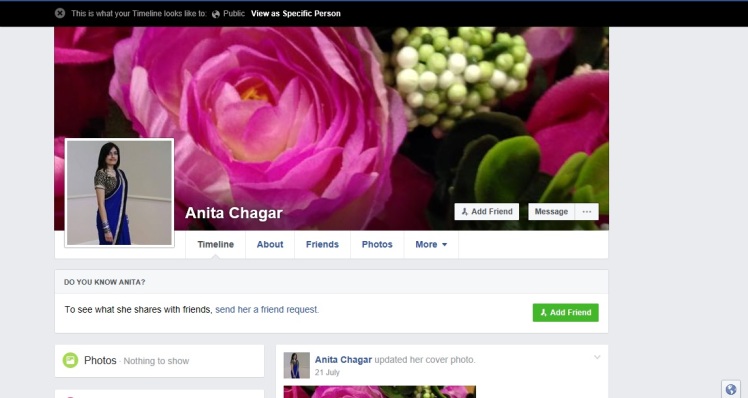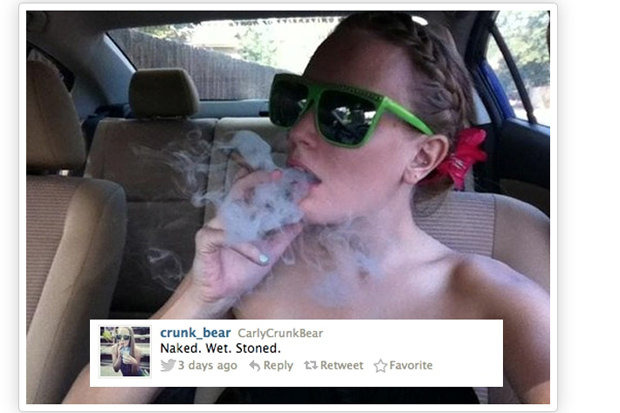The ethical issue I will discuss is privacy, regarding the educational use of social media. A different approach will be taken towards this blog, as I will expand upon an interview I conducted with my sister, who is a secondary school teacher.
The main points from the interview can be seen through the presentation below.

The image above is what a member of the public would see if they were to search for my sister on Facebook, for example a student. Apart from her profile picture and cover photo, no other images are available to the public, as she has edited her privacy settings heavily. Furthermore, the posts of friends onto Anita’s timeline need to be approved by her initially, to prevent unprofessional posts being associated with a teacher.
This ethical issue of privacy on social media links to teachers being fired for their social media posts. For example, Carly McKinney was fired for the inappropriate pictures she tweeted on Twitter, most notably the one captioned ‘Naked. Wet. Stoned.’. The full article can be found here.

Picture source
Ironically, she was not arrested for the possession of drugs. Therefore, as Greenwald (2014) argues, you should take your privacy online seriously, including social media, as what you post online could be newsworthy. If you are sceptical in the way your social media post may be interpreted, then do not post it. After all, Ronson (2015) did point out, ‘the people I met were mostly unemployed, fired for their transgressions’, so think twice about what you want to post on social media.
The YouTube video below explains how teacher – Christine Rubio, was fired due to her Facebook post on wanting her 5th grade students to drown on a school trip. However, her privacy settings were open, if she had edited her settings so only friends could see her posts, she would have remained a teacher.
Teachers live in constant fear about being made redundant due to their social media postings. Consequently, as can be seen with the case of my sister, they exercise a lower degree of authenticity on social media. The extent they go to, for example renaming themselves on Facebook, to make their activity private, is definitely unethical in my opinion. Teachers should be able to be authentic on social media and enjoy the perks it was created for.

References:
Carly full article. Available at: <http://www.dailydot.com/news/carly-crunk-bear-fired-photos/>. [Accessed 25 November 2016].
Carly picture source. Available at: <http://gabworthy.com/technology/meet-the-people-who-ruined-their-careers-with-one-tweet/5/>. [Accessed 25 November 2016].
Greenwald, G (2014) Why privacy matters. Available at: <http://www.ted.com/talks/glenn_greenwald_why_privacy_matters>. [Accessed 25 November 2016].
Ronson, J (2015) How One Stupid Tweet Blew Up Justine Sacco’s Life. Available at: <http://www.nytimes.com/2015/02/15/magazine/how-one-stupid-tweet-ruined-justine-saccos-life.html?_r=2>. [Accessed 25 November 2016].
Teacher fired for her Facebook post. Available at: <https://www.youtube.com/watch?v=DBRZ-lF3t6s>. [Accessed 25 November 2016].
Bibliography:
BBC (2013) UK jumps up internet scoreboard as digital divide grows. Available at: <http://www.bbc.co.uk/news/technology-24426739>. [Accessed 25 November 2016].
BBC (2015) Who’s that girl? The curious case of Leah Palmer. Available at: <http://www.bbc.co.uk/news/technology-31710738>. [Accessed 25 November 2016].
Guardian (2014) Twitter abuse: easy on the messenger. Available at: <https://www.theguardian.com/commentisfree/2014/jan/24/twitter-abuse-abusive-tweets-editorial?CMP=twt_gu>. [Accessed 25 November 2016].
Guidelines on what communication on social media can lead to prosecution. Available at: <http://www.cps.gov.uk/legal/a_to_c/communications_sent_via_social_media/>. [Accessed 25 November 2016].
How teachers can avoid the dark side of social media. Available at: <http://education.cu-portland.edu/blog/principals-office/teachers-avoid-dark-side-of-social-media/>. [Accessed 25 November 2016].
Ten reasons teachers were fired. Available at: <https://www.youtube.com/watch?v=gZg83Dpv2N4>. [Accessed 25 November 2016].
Hi Arun,
I really enjoyed reading your blog and found it enlightening. I thought you took a different approach in writing it than most so that made it more enjoyable to read. The way you incorporated a primary research method in your post as well was refreshing.
A point I’d like to question is Carly McKinney. I wonder as her job profession, is it appropriate for her to be posting photos like that in the first place? As a teacher, she could be a role model to the students she’s teaching. Perhaps it’d be better if she had separate personal and professional accounts just for privacy measures. I do agree with you when you say teachers should be able to be authentic on social media. In your interview with your sister about posting pictures after a night out, I don’t think it’s a problem, as it’s quite a norm. But of course, it’s different when there’s illegal substances involved like Carly.
In relation to you Piktochart, do you know why there are disputes or reluctance in using social media? I’d love to know why!
Nicole
LikeLike
Hi Nicole,
I’m glad you appreciated the primary research in my blog this week, I wanted to do something outside the box, good to hear that it worked out!
As for Carly McKinney, due to being a teacher, she should not be posting those images on her social media platforms, even if she had her own social profile for privacy matters. Like Professor Woodward says, whatever you post on the web, you should be happy for it being published in a local newspaper. Because the professional and social lives of the public are becoming increasingly blurred, I think her images would have been found by either students or work colleagues, it was only a matter of time.
Regarding my Piktochart, teachers are engaging in disputes with students and parents due to the platforms being used for homework tasks. Regarding students, this could be over the usefulness of social media platforms, such as Google +, in completing homework tasks. As with all social media, students can get distracted, which leads to them questioning the relevance of online platforms in enhancing their knowledge of the subject.
For parents, as they are used to the traditional note-taking from an exercise book form of learning, they are having disputes with teachers who want to incorporate new educational methods for their students. Hence, this is why teachers are becoming reluctant to using social media in the classroom.
LikeLiked by 1 person